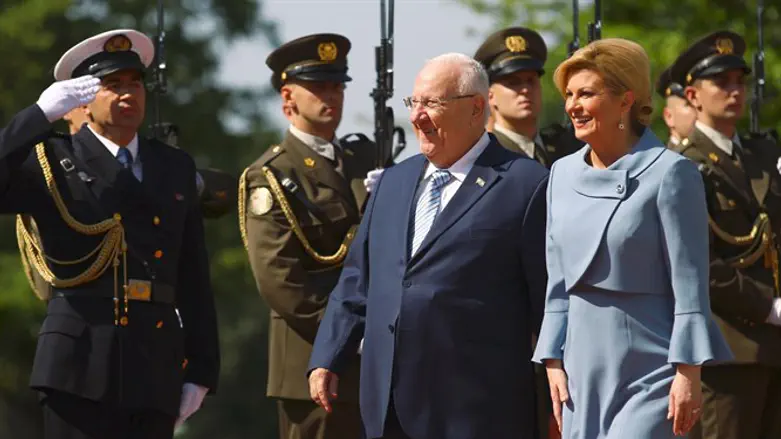
Israeli President Reuven Rivlin on Wednesday urged Croatia to "deal with its past" while paying respect to the victims of the Balkan country's most brutal World War II death camp.
Rivlin was visiting a memorial at the site of the Jasenovac camp, known as "Croatia's Auschwitz", where the country's pro-Nazi Ustasha regime brutally murdered tens of thousands of ethnic Serbs, Jews, Romas and anti-fascists.
Croatia's current government has come under criticism in recent years for failing to tackle lingering intolerance and celebrations of Ustasha slogans and ideology.
"There are some who prefer to repress their past and see it as a 'black hole' which requires no study or soul searching," Rivlin said in Hebrew in front of the memorial site, a towering concrete flower that looms over lush farmland.
"Croatia's ability to deal with the past and not to ignore it is a moral obligation which is a fundamental part of any just society," he said, according to an official translation.
It "will continue to be an important element of the friendship between Croatia and Israel," the Israeli leader added.
Rivlin, who arrived in Zagreb on Tuesday for a two-day visit, was accompanied by his Croatian counterpart Kolinda Grabar-Kitarovic.
The two presidents visited the camp's museum and laid wreaths for the victims at the monument. Rivlin also recited a traditional Jewish prayer.
Grabar-Kitarovic also voiced deep sympathy for victims of the Ustasha regime.
"No political goal or regime can justify crimes committed in its name," she said, pledging to continue to take care of the "collective memory of the crimes committed here."
The number of people killed at Jasenovac, which lies 60 miles southeast of Zagreb, remains disputed.
It varies from tens of thousands to 700,000, according to Serbian figures.
The site remains a place of controversy.
The country's ethnic Serb and Jewish minorities have snubbed the official commemoration at the Jasenovac memorial for the past three years, accusing authorities of tolerating strains of pro-Nazi ideology in society.
They were particularly incensed by the placing of a plaque with an Ustasha slogan near the memorial in November 2016.
The plaque, laid by former paramilitaries, was removed from the camp's immediate vicinity nearly a year later -- only to be displayed at another location around six miles away.
Relations between Croatia and Israel took a dip during the 1990s under president Franjo Tudjman, who led the country's breakaway from Yugoslavia.
Israel accused him of failing to make a strong denunciation of the Ustasha regime, who murdered an estimated 75 percent of the country's 40,000 Jews.
The ties between the two countries have improved since Tudjman's death in 2000.
